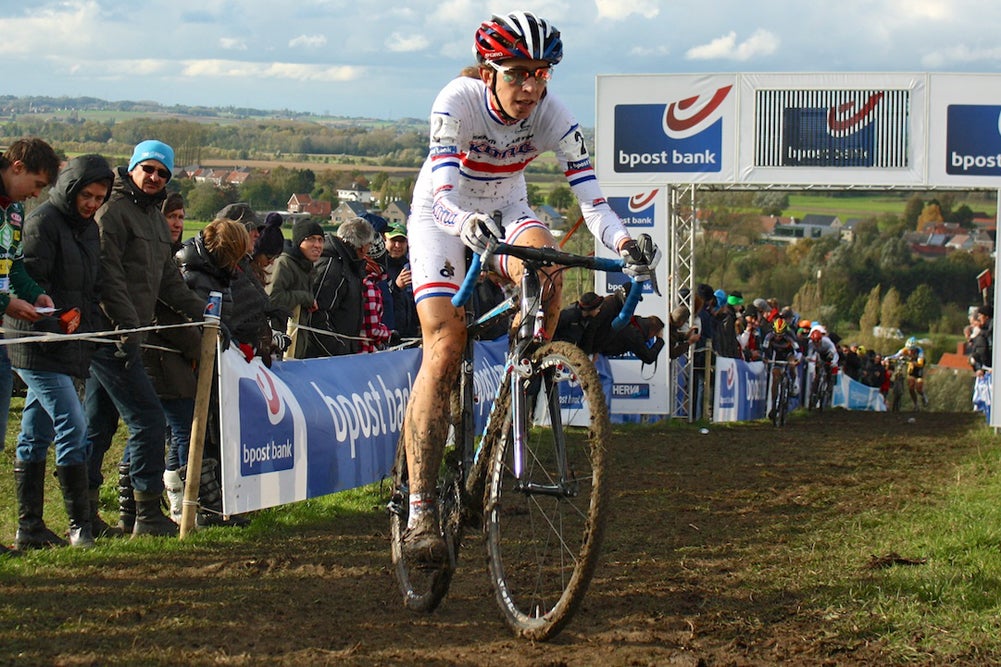Top cyclocross pros still stick-in-the-muds as regards disc brakes

British champion Helen Wyman will test a disc-brake-equipped Kona later this season, but for now she's relying on RP EuroX Magnesium cantilevers. Photo: Dan Seaton
OUDENAARDE, Belgium (VN) — When Jeremy Powers (Rapha-Focus) rode to a seventh-place finish in the Tabor World Cup on October 21, he made history not just because the result was the best ever by an American man, but also because it was the best ever World Cup finish by a rider equipped with disc brakes.
Powers’ impressive run of results on his prototype Focus Mares Disc bike—the most prominent, but not the only good results by Americans running discs—have prompted more than one tech-oriented cyclocross fan to wonder why the biggest new technology in cyclocross remains so scarce among the best-ranked riders in the world, most of whom are based in Europe.
And indeed, the November 1 Koppenbergcross seemed the perfect venue for a disc-equipped bike to shine, especially on the race’s steep and muddy switchbacked descent from the top of the storied Flemish hillside.
But an informal survey of the elite men’s and women’s races turned up not a single disc brake. While riders in Europe have embraced new wheel, tire, frame, and drivetrain technologies in recent years, they remain steadfastly faithful to the cantilever brake designs that have hardly changed in decades.
While to some the reluctance to adopt this single piece of new technology might seem incongruous, riders and mechanics offered a myriad of compelling reasons for continuing to race with their familiar, traditional brakesets.
“If you look at it from a really practical point of view, cyclocross is not a discipline that’s about braking,” said Stefan Wyman, husband and mechanic to British champion Helen Wyman (Kona). “It’s a discipline that’s about not braking.
“So disc brakes give you a bit of an issue there, because at the moment, with the older technology that is still used in disc brakes —cable technology — they’re very much on or off. And that’s not really what you need in ’cross, you want to be able to feather the brakes.”
Nevertheless, Helen Wyman — who presumably made liberal use of her TRP EuroX Magnesium cantilever brakes for the slippery descents on the way to winning the Koppenbergcross — will test a special disc-enabled Kona later this season.
And whether to stay traditional or move to discs will not be a simple decision. Stefan Wyman also pointed out another important benefit of the more traditional technology: serviceability, especially when time-critical, mid-race adjustments are needed.
“With TRP and SwissStop both working hard to develop better and better cantilever technology, you’ve actually got fantastic braking already,” he told VeloNews.com. “And they’re very easy to service, very easy to work on during a race when you have a problem.”
Among the men, two of the world’s best riders both raised another surprising concern. Both Sven Nys (Landbouwkrediet) and Niels Albert (BKCP-Powerplus) said they found the noise that muddy discs sometimes make as they rotate to be highly distracting, an unacceptable tradeoff in a discipline that requires complete concentration.
“We tried a Colnago with the disc brakes, and I liked them when it was dry, but when it was wet I really didn’t like the sound they made,” said Albert. “So that’s maybe a big part of the reason (why I stay with cantilever brakes). There’s also the weight, they definitely weigh more than the normal brakes, but I think in two or three years everybody will be riding discs.”
Nys echoed Albert, adding that, so far, sponsors in Europe have not pushed the switch as they have in America.
“Everybody is afraid for changing the wheels,” he said. “And you hear the noise of the disc brake too. So far Shimano doesn’t ask us to do it, otherwise, maybe we would try it. I tried them on my mountain bike, but never on a cyclocross bike. I have a good feeling with the brakes we have at the moment, and so it’s not a question for our team.”
One rider who said he would be excited to try racing on discs was American Jonathan Page.
“I’ve never tried disc brakes on a ’cross bike, but I could see how it would be an advantage for clearance in the mud,” he said, pointing out the mud that built up in his traditional brakes in just half a lap of the Koppenberg course.
“I’d give it a shot if I had the technology for it, and I think it will come around, even if people are pretty traditional here. I love it on a mountain bike, it makes a big difference when you’re just braking with one finger, so I can see how it would be an advantage.”
But Page has been slow to embrace other new technology. After racing last season on Shimano’s Di2 electronic shifting system, Page is back with Dura-Ace shifting this year. He, like the Wymans, cited the reliability and serviceability of the more mature technology as a prime motivation.
But Page added that he was still open to some new technology.
“Myself, I’m all about tradition,” he said. “Except disc brakes. I’d give them a shot.”